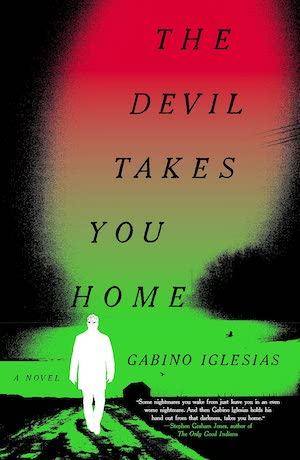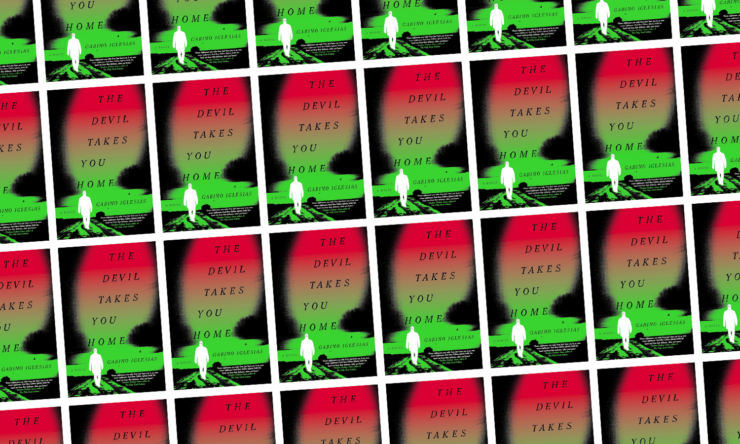There’s a line from the second season of Twin Peaks that rattled through my head a lot while reading Gabino Iglesias’ The Devil Takes You Home. Several of the show’s characters are debating the nature of the nature of the murder they’ve just solved—and whether or not its cause is supernatural. “An evil that great, in this beautiful world. Finally—does it matter what the cause?” asks one character.
It’s a question to keep in mind when reading Iglesias’ novel. It’s eminently possible to read this novel as a work of noir fiction with supernatural elements lurking just out of frame. It’s also possible—in theory—to view many of the uncanny elements here as being visions born out of stress, a lack of sleep, or a lack of light. In some ways, that ambiguity fits this novel neatly alongside recent works by M. John Harrison (The Sunken Land Begins to Rise Again), Laird Barron (Worse Angels), and Paul Tremblay (The Pallbearers Club).
But while it shares that ambiguous quality with some other notable works of fiction, Iglesias puts his own spin on that sense of ambiguity. This novel also shares a quality with many works by the late Jack Ketchum—namely, the idea that a book doesn’t have to have supernatural elements in it to be every bit as horrific as a work with zombies, werewolves, or restless spirits. The Devil Takes You Home is as much about horror emerging from something quotidian as it is the surreal rituals or underworld politics that drive its plot forward. What’s more frightening—that a monster could carry out a series of murders, or that an ordinary man working an office job could find himself capable of being a gun for hire—and an enthusiastic and talented one at that?
Buy the Book


The Devil Takes You Home
Mario, our narrator and protagonist, opens the book in a bad place. He and his wife Melisa have just learned that their four-year-old daughter Anita has been diagnosed with leukemia. Soon afterwards, Mario loses his job working for a Texas insurance company; desperate for money, he links up with Brian, a former colleague who’s begun selling drugs. Brian lines him up with work as an assassin—telling him “This is a bad guy” of his first target. (This juxtaposition of hits and horror recalls Ben Whishaw’s film Kill List at times, which is a fine thing.) But once Mario has accomplished his task, he sees something disquieting in the body in front of him: “It was like something was feasting on the man’s flesh, but from inside his skin.”
Things get worse from there. Mario’s family disintegrates, and Mario himself discovers that he has a violent side—which leads to Melisa’s departure after he attacks her. Eventually, Brian offers him a more complex job—one which will send them to both sides of the U.S./Mexico border. Leading them in this task is a man named Juanca, whose motives are initially unclear. The fact that Brian is attempting to kick his drug habit cold turkey due to a child on the way further complicates matters, as does the ages-old question that comes up when amoral people with guns head into the unknown: can any of them trust one another, especially when substantial sums of money are involved?
All of that would make a perfectly satisfactory engine to drive this particular story. But Iglesias has a tendency to fold body horror and eldritch nightmares in with crime fiction elements—if you’ve read his previous novels Zero Saints and Coyote Songs, this is very much in keeping with those. (Full disclosure here: I’ve published a number of Iglesias’ writings on books at Vol.1 Brooklyn.) As these three men make their way across the southern United States and northern Mexico, the sights they see are increasingly harrowing—glimpses of bizarre creatures in tunnels below the border, along with a pair of genuinely horrific rituals that involve awful things being done to the human body. Here, again, the supernatural is handled elliptically, while a handful of scenes involving mutilated bodies are recounted with an unsettling level of detail.
The novel’s realistic and uncanny elements converge in a climactic showdown that also involves a mysterious box, a pair of racist sharpshooters, and a whole lot of knives. It’s a sequence that plays out with nightmare logic, where any sense of what the next logical step might be is abandoned for utter chaos. Even as Mario finds himself suited to certain acts of violence, this particular moment finds him at an utter disadvantage, struggling to make sense of the war zone in which he’s found himself. It also taps into a motif that recurs throughout the book—namely, that Mario has found himself in a world he’s not entirely ready to comprehend.
Over the course of The Devil Takes You Home, Iglesias hints at that larger world , from the cartel politics that drives some of its more connected characters to that world to the question of what’s sent Juanca on this particular path. Eventually, Iglesias reveals that, too—and the meticulous ways in which he parcels out information on what’s brought each of these three men on this trip, and to what extent they can trust one another, pays off several times over by novel’s end.
To read The Devil Takes You Home is to surround yourself with a number of morally compromised figures, where even the most sympathetic among them have still made their peace with people capable of monstrous acts. It’s one part road narrative, one part waking nightmare, and one part revelation. And just like some revelations past, this one has something apocalyptic lurking inside.
The Devil Takes You Home is published by Mulholland Books.
 Tobias Carroll is the managing editor of Vol.1 Brooklyn. He is the author of the short story collection Transitory (Civil Coping Mechanisms) and the novel Reel (Rare Bird Books).
Tobias Carroll is the managing editor of Vol.1 Brooklyn. He is the author of the short story collection Transitory (Civil Coping Mechanisms) and the novel Reel (Rare Bird Books).










